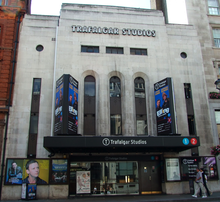Whitehall farce

The Whitehall farces were a series of five long-running comic stage plays at the
History
The farces; critical reception
The five farces were as follows:
| Title | Author | Premiere | Closed | Performances |
|---|---|---|---|---|
| Reluctant Heroes | Colin Morris | 12 September 1950[2] | 24 July 1954[3] | 1,610[4] |
| Dry Rot | John Chapman | 31 August 1954[5] | 15 March 1958[6] | 1,475[4] |
| Simple Spymen | John Chapman | 19 March 1958[7] | 29 July 1961[8] | 1,403[4] |
| One For the Pot | Ray Cooney and Tony Hilton | 2 August 1961[9] | 4 July 1964[10] | ~1,210 |
| Chase Me, Comrade | Ray Cooney | 15 July 1964[11] | 21 May 1966[12] | ~765 |
Rix built a company of regular players who appeared in some or all of these shows. They included
Although the five plays constituting the Whitehall farces had long runs and the theatres usually had full houses, the majority of London critics were dismissive of them. Writing in the
Television broadcasts; later productions
In addition to the five long-running farces, Rix presented a series of more than eighty one-off televised comedies, some of them farces, for the BBC. The first was transmitted live from the Whitehall Theatre in January 1956.[24] There were also film versions of Reluctant Heroes (1951), Dry Rot (1956), and Chase Me, Comrade, which was renamed Not Now, Comrade (1976).[25][26][27][28]
In 1966, having been unable to secure the lease of the Whitehall Theatre, Rix took his company on tour in Chase Me, Comrade and Bang, Bang Beirut (later retitled Stand By Your Bedouin), by Cooney and Hilton.[29] Later productions by the Rix company at the Garrick Theatre and elsewhere included Uproar in the House (1967), by Anthony Marriott and Alistair Foot; Let Sleeping Wives Lie (also 1967) by Harold Brooke and Kay Bannerman; She's Done It Again (1969), by Michael Pertwee; Don't Just Lie There, Say Something (Pertwee, 1971); and A Bit Between the Teeth (Pertwee, 1974). According to Leslie Smith in a study of modern British farce, although some of the Rix productions after Chase Me, Comrade achieved substantial success, none of them had the conspicuously long runs of the five Whitehall farces.[30] In 1976, Rix returned to the Whitehall with Fringe Benefits (Donald Churchill and Cooney) which ran until 1977 when he retired from the stage.
Notes
- ^ Nightingale, Benedict. "Theater; England's Endless Love Affair with Farce", The New York Times, 30 August 1987, 2 June 2012
- ^ Gaye, p. 1537
- ^ "Theatres", The Times 21 July 1954, p. 2
- ^ a b c "12 Successful Years for Mr. Brian Rix", The Times, 13 September 1962, p. 12
- ^ Gaye, p. 1530
- ^ "St. Martin's Theatre", The Times, 11 March 1958, p. 3
- ^ Gaye, p. 1538
- ^ "Theatres", The Times, 27 July 1961, p. 2
- ^ Gaye, p. 1536
- ^ "Theatres", The Times, 1 July 1964, p. 2
- ^ Gaye, p. 193
- ^ Smith, p. 91
- ^ Smith, p. 97
- ^ Gaye, p. 100
- ^ Chapman, p. 3
- ^ "Whitehall Theatre", The Times, 13 September 1950, p. 6
- ^ Smith, p. 76
- ^ Chapman, passim
- ^ Smith, p. 86
- ^ Smith, p. 93
- ^ Smith, pp. 58, 77 and 84
- ^ Coveney, Michael. "Simple Spymen", Financial Times, 11 August 1980, p. 9
- ^ Smith, p. 70
- ^ Rix, Brian. "The Whitehall farces had a major role in the TV-theatre relationship", The Guardian, 7 April 2010
- ^ "Reluctant Heroes (1951) - Trailers, Reviews, Synopsis, Showtimes and Cast". AllMovie. Retrieved 2013-09-16.
- IMDb
- ^ "Dry Rot | Film review and movie reviews". Radio Times. 2013-04-08. Retrieved 2014-07-29.
- ^ "Networkonair > Features > Not Now Comrade".
- ^ Smith, p. 96
- ^ Smith, pp. 97–98
References
- Chapman, John (1960). Simple Spymen – a farce. London: English Theatre Guild. OCLC 13446148.
- Gaye, Freda, ed. (1967). Who's Who in the Theatre (fourteenth ed.). London: Sir Isaac Pitman and Sons. OCLC 5997224.
- Smith, Leslie (1967). "Brian Rix and the Whitehall Farces". Modern British Farce: A Selective Study of British Farce from Pinero to the Present Day. Basingstoke: Macmillan. ISBN 0333448782.
